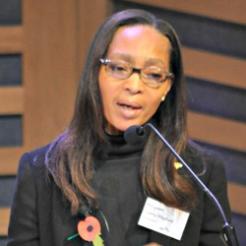Every large charity should have someone on the staff who is responsible for governance, the chair of ActionAid UK said this week.
And it is time for donors to “grow up” and realise that good governance does not come for free and must be paid for, Margaret Casely-Hayford said.
Casely-Hayford, who is also a non-executive director on the board of NHS England and worked for nine years as the director of legal services and company secretary of the John Lewis Partnership, was delivering the closing plenary at NCVO’s Trustee Conference on Monday.
She said that governance "used to be boring" but thanks to the failures in governance at institutions such as the Co-operative, VW, the major banks and Fifa, and the recent scandals of the Stephen Lawrence inquiry, Lord Sewell, and MPs’ expenses, governance has become “the new black”.
And if the Daily Mail, which has the highest number of online hits of any newspaper in the world, has decided that charity governance is a sexy topic, then it “must be sexy and we cannot ignore it”, she said.
Casely-Hayford said it was “utterly bizarre” that legislation expects more from large public companies who serve shareholders, than from civil society organisations who serve society’s most vulnerable people.
It was the beneficiaries of Kids Company that bore the cost of that charity’s collapse, she said.
“In my view there needs to be a significant realignment in the minds of the public and the media about governance. Let’s be up-front about its importance and let’s be up-front about its cost.”
Governance reviews are a good investment
When she became chair of ActionAid UK in November 2015, she instigated a governance review, inviting Cass Business School to review the charity’s governance. They found no “gremlins”, she said, but did recommend some improvements.
“When Kids Company collapsed I felt thoroughly vindicated in spending the money we did on that review,” she said.
“We are much less likely to be the next tabloid headline, with all the diversion of funds and energy that that would require, and we are much better prepared if things do go wrong.”
ActionAid has also recently appointed someone to the new role of technical governance specialist: “For larger charities I think there should be someone on the staff who has the governance mandate,” Casel-Hayford said.
“Trustee boards should be hearing one of three things if your organisation is correctly structured,” she said. “One, everything is going well. Two, things are not going quite as well as planned but this is what we as management are doing to put that right. Or three, it’s all going to hell in a hand-cart, please help.”
Trustee boards must not be afraid to question management, to carry out governance reviews, and to turf out long-serving board members, she said.
Educating funders about the importance of good governance
They also need to recognise that their charity’s brand and reputation is an asset and must educate donors about the benefits of spending time and money protecting those assets.
“Donors cannot continually expect this to be something we do for nothing,” she said.
"The term ‘charity’ should be critical for us to protect as a sector. Let’s operate as a charitable federation here in the UK, sharing best practice and reviewing each other.”
Peer reviews
She closed her speech by suggesting three ways for charities to improve their governance.
The first was for those people responsible for governance within their organisations to meet informally but regularly to share information and practices.
The second was to introduce a peer review process, where a representative from each charity attends an awayday once a year to “pause for thought and look at what others are doing”.
And the third was for the lessons from Charity Commission investigations and case studies to be shared amongst charities in the sector – a tendency for “less scapegoating and more learning”, she said.









